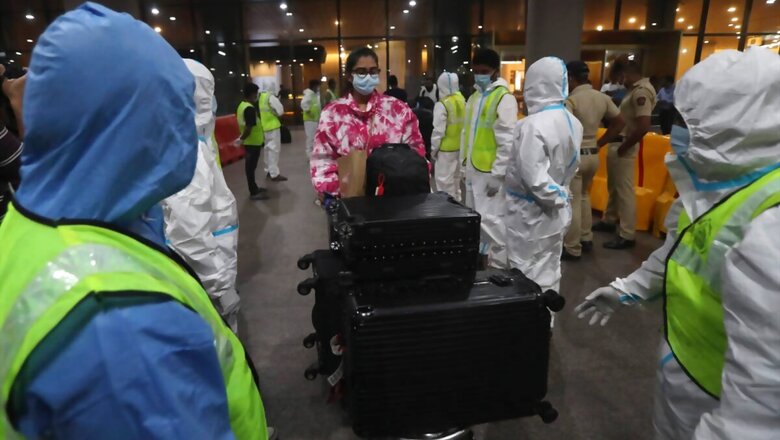
views
As India gears up for mass inoculation against Covid-19 and cases of Coronavirus infection continue to see a steady trend of decline, flight services from the United Kingdom to India resumed on Friday after restrictions imposed in the wake of the new variant of Coronavirus were lifted.
On December 14, the United Kingdom and Northern Ireland reported a new variant of SARS-CoV-2 to the World Health Organization. Called B117, the variant spreads more rapidly even though initial studies show that it is not associated with severity of the Covid-19 disease. Studies are also underway in India and abroad to study whether the mutated train will hamper efficacy of vaccines against the novel Coronavirus.
India had initially banned all flights originating from the United Kingdom to India from December 22 to December 31. This ban was extended up to January 7. In the meantime, the government began genomic surveillance of samples collected from UK returnees to check for the UK variant of the virus. As on Friday, 82 people were found to be infected with the new strain of the novel Coronavirus, the Union health ministry said.
Move ahead with caution and continuous surveillance
Public health experts and government scientists said that the resumption of flight services has to be accompanied with caution and a continuous and close surveillance of those who have returned from the UK.
Manoj Murhekar, Director, National Institute of Epidemiology, Chennai, said that even as genomic surveillance of UK returnees is underway, it is quite likely that the strain has been circulation since it was first detected in September. Murhekar said that the government’s detailed genomic surveillance exercise will reveal whether it has indeed been in circulation prior to November-December period.
Murhekar was referring to the genomic surveillance exercise that has been underway since April at National Institute of Virology, Pune; Integrative Biology (IGIB), Delhi; National Institute of Biomedical Genomics (NIBMG), Kalyani, West Bengal and Centre for Cellular and Molecular Biology, Hyderabad. In the last of December, the government also formed a consortium of autonomous scientific institutions to study the evolution of the virus, to expand genomic surveillance and co-related it to the trends in transmission of the infection.
By December end, over 4,500 samples collected from various parts of the country were sequenced to check for different strains.
“We are not seeing any increase in the number of cases nationally, we have seen decline from a high of 90,000 plus per day. Data from England has shown it is not associated with more severity. It is more transmissible but not more severe. I don’t think we will see a major upsurge, based on the trends we are witnessing,” Murhekar said.
According to the WHO, retrospective analysis traced the first identified variant to Kent, South East England, on 20 September 2020, which was followed by a rapid increase of the same variant identified later in November.
D.C.S Reddy, former professor and head of community medicine, IMS-Benaras Hindu University and member of a government expert group on Covid-19 surveillance, said that health authorities need to follow the same protocol and principles followed back in March 2020 – test, track, treat.
“The UK variant has changes in spike protein and is feared to spread rapidly. In England, this variant was predominant in clusters with rapid spread. In India, the epidemic is on the decline and this variant seems to have potential to affect that scenario,” said Reddy.
He added, “However, this can be prevented with the standard protocol of test, track, treat. Those arriving from the UK need to be screened and tested, isolated if positive, and their contacts ought to be traced. Further, even those who test negative should be quarantined at home. There is a possibility that they might have picked up the infection just hours or days prior to their arrival. They still have the potential to transmit the infection.”
Read all the Latest News, Breaking News and Coronavirus News here

















Comments
0 comment